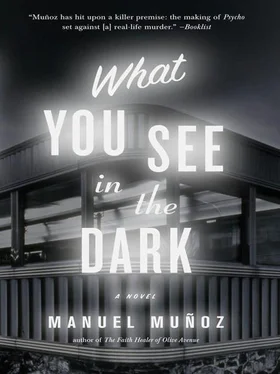They’d eat these treats sitting on the curb in front of the green door leading up to her apartment, mostly in the early part of the week. The closer the days got to Friday, the busier the bowling alley became in the evening, and Cheno withdrew, as if he didn’t want to be seen by anyone. She liked this about him, as if their short evenings were a secret between them, despite meeting out in the open. As the days passed, her affection for him grew, the way his gentle fingers carefully handed over his latest gift, not wanting to touch and offend her, his round eyes taking her in like light. She began to notice mornings when he wasn’t at the corner at all, the catcalls uninterrupted, and these disappearances alarmed her at first, until she figured out that he was wheedling himself into more work. She left the curtains open one night so that the dawn light would wake her as she lay in her bed under the window. She hoisted herself up on her elbows to peer down, and sure enough, there was Cheno in the hushed violet of five in the morning with a few other hard workers, ready to go, and not ten minutes later, he climbed into a farmer’s truck and was whisked away, his head turning toward her apartment and his gaze steady on her window.
It wasn’t love. She knew that. But she liked the attention, wishing to herself that maybe time would transform her feelings into the kind of longing her mother had displayed, the longing that drove her back to Texas. When they had lived together, her mother had played old blues records with women singing the way only women could about love, love gone right, love gone wrong. Sixteen records that her mother cared for rigorously, searching for scratches, easing them back into their paper sleeves, bringing them out only when the mood struck.
Pull out the one with the red slip, her mother had told her one time. They sat on the bed, right underneath the window to catch the evening breeze, two glasses of water with ice long since melted. Man from Abilene, her mother had told her, a sad song, and the way her mother requested it, Teresa had known that sad music was something that you should listen to alone.
The crackle of the needle brought the easy strum of a guitar and a harmonica. Her mother hummed along but sighed and gave the singer space for her lament, not interrupting. The singer moaned, cursing Abilene, a whole story of pain that could have been avoided if she had ignored the deep brown eyes she still managed to sing about. The guitar strummed along, one beat after the other, a monotony, but easy to tap your heel to. Put it on again, her mother had said.
Outside, just like the morning Cheno rode off with his love-struck ambition, the street held violet and their rented room had darkened enough for Teresa to watch her mother close her eyes and listen to the song. Her mother had played that song hundreds of times, yet as their room darkened, Teresa made out the burn of her mother’s sorrow only by the sound of the song, the way she hummed a little louder when the lyrics matched her own life.
All of her mother’s records were like that in some respect, some speck of phrasing, some line or two that could draw out the mmm from her throat in confirmation. Again, her mother had said with a sigh, the violet of evening seeping into their room.
Teresa didn’t want to be like that. She watched the street corner begin to buzz with the approach of the Mexican workers and thought of Cheno. She could never be like her mother for Cheno. Love could not be a heavy darkness. It could not be violet light in a window, fading. She wanted love to be like the open arms of the women singers in the display windows of Stewart’s Appliances, all receiving and nothing ever lost.
It felt decisive, this feeling about how to control her own heart, and she set out to work as she always did, the catcalling and the stale dustiness of the storeroom and the glow of the TV sets in the store window all coming as familiar as ever. Days passed, and when Cheno didn’t appear, she began to miss his presence, the street bare of anyone when she approached her apartment in the early evenings. More and more days passed and she began to wonder if Cheno had left for more lucrative work up near Fresno, a silent room in her heart wondering if, in fact, another woman had caught his attention.
Whatever filled her about Cheno’s absence was neither anger nor loneliness nor regret, but she could not identify it, could not place words against what it was. Teresa sank at the possibility that the dark space inside her would spark into one of those emotions, a tiny match struck in the dark — how easy it would be to become her mother upstairs in that room with its single bed under the window and the empty kitchen table with two chairs.
When Cheno finally did appear, her relief came as a surprise. Even from two blocks down the street, she could tell it was him, the gleam of his white T-shirt, his small frame waiting patiently by her door. He’d returned after all, and even if it hadn’t been love that stirred within her, she sighed at the release of the mysterious grip within, grateful to have Cheno back.
The closer she walked to him, the more she could tell he was holding something, a large, bulky object, and when she crossed the last street and neared the apartment, she could finally make out the rounded curves of a small guitar that Cheno held in his arms.
“Un regalito,” he said, handing her the gift.
She took the guitar. “Where have you been?” she asked him in Spanish.
“Al norte,” he said. “Pueblitos.” He’d gone way north of Bakersfield, staying in small labor camps, following whatever crops he could and saving his dollars, and she knew his motivation without needing him to declare it. Even after presenting her with the guitar, Cheno kept his hand on the fret board, holding his fingers there as he told her about the day he’d seen her in front of a store window and how, after she’d walked away, he’d gone to see what she’d been watching. The show had ended, but he asked someone, who told him the young girl always watched the afternoon variety show to see the singers.
“But a guitar?” Teresa asked. “I don’t know how to play.”
“I’ll teach you,” Cheno said, his voice so sincere and small that Teresa could do nothing but smile and clutch the guitar to her chest, embracing it, before dipping her hand into her purse and extracting the key. She had no worries about Cheno doing anything untoward. Even as he followed, his steps feathered up, as if he were hardly there, as if he were floating, as if he had been down on the street corner as he’d always been, alighting with his small boots in the air and coming right through the open window of her small room, the light blue curtains parting for him.
How long did this go on? It had been late summer when he’d given her the guitar, her apartment still orange in the late evening. Cheno left whenever daylight started to go. She kept the guitar in the closet on his urging, covering it with a light cloth, and whenever he returned, he’d turn the instrument round and round in his hands, checking for cracks before handing it to her. He taught her a few chords and they’d share whatever treat he’d brought her — lemon drops or dried, sugared mango — as he listened to her practice, his patience infinite. She got to thinking, at times when she watched him demonstrate a chord she was finding difficult, that he was the only person who’d been in the apartment besides her mother, yet her mother’s dark presence was long gone, and as the months drifted into fall and sundown came earlier and earlier, she finally made it clear to Cheno that it was okay for him to stay a few minutes longer after she turned on the bare bulb in the center of the room.
You’ll understand one day, her mother had said at the bus station. When you find a man of your own, you’ll know why you’ll run toward him.
Читать дальше












